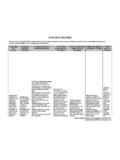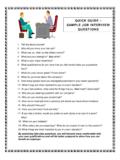Transcription of Change Your Negative Thinking - montrealcbtpsychologist.com
1 Danny Gagnon PhD, Psychologist (514) 605-7610 1 HOW TO Change Negative Thinking For there is nothing either good or bad, but Thinking makes it so. William Shakespeare, Hamlet, Act 2, Scene 2, 239 251. Although you may not be fully aware of it, our minds are always on the go throughout the day. Our minds are constantly experiencing events, labeling objects, Thinking about what to make for dinner, about planning a trip and so forth. The amount of things we think about through out the day is limitless. Although we all experience moments of Negative Thinking , if you are constantly experiencing anxiety, depression or anger that is affecting the quality of your life, chances are you are engaging in an excessive amount of Negative Thinking .
2 For example, if you are anxious more often than not, you may fear being fired from your job if you are late. If caught in a traffic jam you may feel like suffocating and unable to escape. When listening to the news on TV, you may perceive that the world is full of horrible catastrophes and wars. In contrast, if you are feeling depressed, you may perceive rejection if a friend calls to cancel an outing with you. You may feel like the world is against because the weather is rainy and you cannot go hiking. You may believe that you will never get that promotion at work. COGNITIVE THERAPY: HOW WHAT WE THINK LEADS TO OUR EMOTIONS Do situations cause our emotions?
3 It is probably safe to say that the majority of people believe that emotions are the direct result of the events that we experience as shown in the model below. Hint: Take a moment right now and stop yourself during the day and ask yourself, What was I just Thinking about? Trace your thoughts back in time. Chances are you ll be aware that you were Thinking of all sorts of things. Our minds are always in motion! Situation Emotion Danny Gagnon PhD, Psychologist (514) 605-7610 2 However, one of the most powerful and revolutionary advances in psychology was the discovery of the effect that thoughts, beliefs and perceptions have on our emotions.
4 Thus, the model above is only partially correct. So although a situation may have some bearing on how we feel, by far the biggest effect comes from our interpretation of the event, that is the thoughts, beliefs and perceptions that go through our minds about the situation. This breakthrough was extremely exciting to psychologists, as we could now give hope to people suffering from psychological problems. Through scientific research studies, psychologists now had an added tool in which to help people. Here is the complete Cognitive Therapy (CT) model for how thoughts influence emotions and our behaviour. If you have read the toolkit on What Is Cognitive Behavioural Therapy, you may notice that the link between thoughts, behaviours and emotions is repeated here.
5 If this model is not completely clear, let s go through an example. Let s say you are waiting for a friend to meet you for the movies at 6:00pm. It s now 6:30pm and they still have not shown up. The table below demonstrates how different thoughts can lead to different emotions while the situation remains the same. Situation Automatic Thought Emotion 1. A friend is late for the movies. I hope he s all right and nothing happened. anxiety. 2. A friend is late for the movies. He s always late!! anger or frustration. 3. A friend is late for the movies. I guess he doesn t like me and doesn t want to be my friend.
6 Sad or depressed. Situation Automatic Thoughts Emotion Behaviour Danny Gagnon PhD, Psychologist (514) 605-7610 3 Now let s test you! Here is another example for you to complete. The answers are found just after the table. Situation Automatic Thought Emotion 1. You had an argument with your boss. How dare he speak to me like that! 2. You had an argument with your boss. He doesn t like me. 3. You had an argument with your boss. I m going to be fired! Answers: 1) anger or frustration; 2) sad or depressed; 3) anxiety. You may have noticed in the model above that thoughts are labeled as automatic thoughts.
7 Before showing you how to Change your Negative Thinking , it is really important to understand what is meant by automatic thoughts. Automatic thoughts can be thoughts, mental images or pictures, memories or even physical sensations that go through our minds. Psychologists call them automatic because they pass quickly through our minds and we are not totally aware of them. A good analogy is that they are like reflexes that occur quickly and spontaneously to an event. A useful example: Automatic thoughts are critical to changing Negative Thinking but can be a difficult concept to grasp.
8 Let s see if this example can help. Automatic thoughts develop from repeated experiences. For example, if someone were constantly criticized by their parents, they might have the thought I can t do anything right every time they made even the slightest mistake. This could develop into an automatic thought every time they are faced with a similar situation because repeated experiences have led to the same result, that of being criticized. The thought also becomes automatic because our minds can only hold so much information at a time. Our mind develops patterns or short cuts to interpret our individual reality that become automatic reactions to events.
9 In the case of automatic thoughts, we are not fully aware of them, just the associated emotion. Automatic thoughts can be compared to driving a car. When driving, do you tell yourself how much pressure you need to apply to the accelerator or how much force you need to apply to the steering wheel to turn the wheel so many degrees? Of course not! You ve done it so many times that it has become automatic and you are not aware of the numerous calculations and judgments you are making every second while driving. Likewise, when talking, we don t think about the shapes we make with our lips or the amount of air we push out our mouths to make syllables.
10 Automatic thoughts are similar to these examples, quick and automatic! Danny Gagnon PhD, Psychologist (514) 605-7610 4 COGNITIVE ERRORS AND FALLING INTO Thinking TRAPS Psychologists have found that we frequently fall into what are called cognitive errors or cognitive traps . Studies have shown us that unpleasant emotions such as anxiety, sadness and anger colour or affect how we perceive the world by filtering out disconfirming evidence against our automatic thoughts. In fact, once you get used to changing your Negative Thinking , you will probably notice that you were not very objective in how you perceived a situation.








